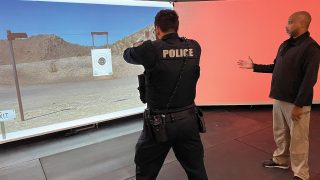
What do all leaders have in common? They have authority, responsibility, obligations, a duty to act and/or perform, and power. The majority of leaders and supervisors fulfill each of those requirements, but the one requirement that many fail to use responsibly is power. I’m certain that everyone can remember one or more leaders/supervisors who wielded the power of their position and rank with such flagrance that they were abusive.
But what is power? Stephen Robbins and Mary Coulter[1]Stephen Robbins, Mary Coulter. Management: 2003 Updates (7th Edition). New Jersey: Prentice Hall. define power as: “The structurally determined potential for obtaining favored payoffs in relations where interests are opposed.”
This means that based on the situation and the subordinate, leaders need to use several leadership styles (authoritarian, autocratic, contingency, situational, etc.) to gain the “buy-in” of the subordinates to complete the task in a manner the subordinates want to do it, as opposed to feeling they have no choice.
In many instances, newly promoted leaders lack the mentorship and experience to know how to wield their newfound power and, instead, either become power-hungry or fail to use it properly.
In my career, I have witnessed too many leaders who fail to wield their power responsibly and instead use it for personal and professional gain. Paula Braynion[2]Paula Braynion. “Power and leadership,” tinyurl.com/f6drh7t2, 2004. cites a quote from Hershey, who said, “Leaders who understand and know how to use power are more effective than those who do not or will not use power.”
Robbins and Coulter cite research by John French and Bertram Raven (1968), who identified five sources of leadership power.
- Legitimate power: The power a leader has by virtue of their position in the organization. Subordinates will follow the directions of this leader because of the authority the leader has in the organization.
- Coercive power: The power a leader has because of their ability to punish or control. Subordinates will follow this leader out of fear of negative consequences.
- Reward power: The power a leader has because of their ability to dispense positive benefits or rewards. Followers will follow this leader in order to receive a positive consequence, such as a raise, promotion or award.
- Expert power: The influence that is based on special skills, expertise or knowledge.
- Referent power: Power that arises because of a person’s desirable resources or personal traits. A follower who believes the leader has charisma may identify with that person.
Knowing how to use each type of leadership power successfully comes with experience. It must be mentioned that our charisma also plays a role in how successful we are as a leader. Some people have the natural and innate ability to command a room. When they enter a room, people are normally attracted to them and don’t know why, while others must try to prove themselves before people will listen.
We must also be cognizant of the consequences of power. In his book The Art and Science of Leadership (6th edition, 2012), Afsaneh Nahavandi states that power changes people, and the consequences of attaining power can be both positive and negative. The positive aspects of attaining power find that leaders tend to be more action-oriented, may show more interpersonal sensitivity toward others, focus on rules rather than outcomes and are more generous.
However, the negative aspects of attaining power demonstrate that leaders may focus on retaining their power and attaining more, start believing they are more in touch with others than they actually are, become oblivious to the needs of those who have less power and may become addicted to the power. In essence, they can become corrupt, abusive, intolerant, dismissive, demanding and unethical.
The proverb “power corrupts people” has truth for both an individual and an organization. People who become corrupt with power create a cycle that leads to an organization of low morale, poor performance, low organizational commitment, high turnover, deviant behavior and, most important, poor decisions. Corrupt leaders will also act without accountability and with impunity.
The abusive nature and corruption of an organization’s culture occurs because of individual leader characteristics, follower reaction and organizational factors. The cycle leads to the disconnect between leaders and followers, and the leader’s inflated view of themselves. This behavior then leads to followers pandering to a leaders every whim, withholding information, making things appear better than they are and doing what they can to be invisible.
So, what can we do to solve the issues with corrupt and/or abusive leaders? The solution is to have: a clear message and consistency; accountability; reduced uncertainty; training for leaders and followers; protection of employees; open communication; leader involvement in day-to-day activities; reduced follower dependence on the leader; empowerment; objective performance measures; involvement of outsiders; and changing the organizational culture (meaning “change management”).
As you can see, the power wielded by leaders has both a responsibility and consequence. As General Omar Bradley once said:
“The test of a leader lies in the reaction and response of his followers. He should not have to impose authority. Bossiness in itself never made a leader. He must make his influence felt by example and the instilling of confidence in his followers. The greatness of a leader is measured by the achievements of the led. This is the ultimate test of his effectiveness.”
References
| 1 | Stephen Robbins, Mary Coulter. Management: 2003 Updates (7th Edition). New Jersey: Prentice Hall. |
|---|---|
| 2 | Paula Braynion. “Power and leadership,” tinyurl.com/f6drh7t2, 2004. |





